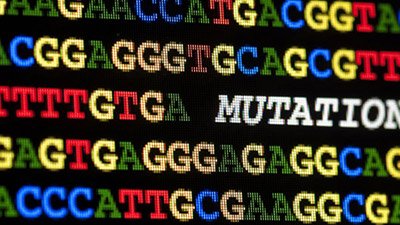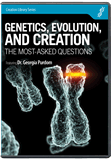Making the Evolution Pill Easier to Swallow
Part 2
The following is part 2 of a series of articles reviewing presentations given as part of the program “Your Genes and You: Health, Disease, and Medicine” offered by the University of Cincinnati in 2009.
The fourth presentation in the program had an intriguing title “Darwin, Mutations, and Birth Defects.” The presenter even started by saying, “What the heck does Darwin have to do with birth defects?” In other words, it’s not an obvious correlation (could it be because Darwin’s ideas really have no connection to birth defects?!). The reason for the title appeared to be that since mutations result in birth defects and mutation is an important mechanism for adding “new” genetic material and allowing organisms to evolve from molecules to man, they must be connected. Once again we see an attempt to “tack on” Darwin’s ideas (origins science) to modern medicine (operational science).
The presenter discussed Down syndrome (which is caused by an extra copy of chromosome 21) and several birth defects that are due to translocations and fusions (rearrangement of parts of chromosomes resulting in abnormal chromosome fusions). Then, seemingly out of the blue, we were presented with chimp and human DNA similarities yet again.
The presenter discussed the similarities between human chromosome 2 and chimp chromosomes 12 and 13 suggesting that a fusion of the chimp chromosomes had occurred resulting in human chromosome 2 (there are significant problems with this idea). The topics of birth defects and human/chimp DNA similarities were connected by the idea that translocations and fusions may provide a selective advantage leading to a new species or sub-species—just as it supposedly did in the evolution of humans from chimps. In the presenter’s view, birth defects are the “trial and error” of evolution, and eventually this could create a new species or sub-species of human.
A variety of birth defects and their genetic causes were subsequently presented. It was truly sad to see how small changes in the DNA can have devastating consequences for a child. The presenter said some birth defects are caused by abnormal repeats of genes or parts of genes and that over millions of years this could lead to new genes with novel functions. Again, the conclusion was that this could eventually create a new species of human.
The presentation concluded with a slide that stated these points:
- Birth defects do not lead specifically to evolutionary changes
- Birth defects may be a result of evolutionary changes
- Trial and error of nature
- Reflect the evolutionary changes of the past which may result in a poor outcome for a limited number of individuals
- May reflect the ongoing changes which will take a great deal of time to be present in a substantial portion of the population
So, children with birth defects are the “errors” of nature. Eventually, evolution will get it “right,” and the human population as a whole will be better off. The presenter said children with birth defects are the “bumps” in the road on our way to becoming better and more evolved. I asked a good friend of mine (who has a child with a chromosomal abnormality) what she thought about her child being an “error” and a “bump,” and let’s just say she wasn’t very favorable of the presenter’s ideas!
During the question and answer time, a gentleman near me asked the question as to why children with birth defects were allowed to “perpetuate” (his words) themselves. I was glad someone asked this question because I was thinking the same thing. From an evolutionary perspective, why use money and resources to study and treat children with birth defects and allow them to reproduce if they are nature’s “errors”? After all, it’s survival of the fittest, not survival of the weakest. According to evolutionary ideas, individuals with birth defects are hampering the evolution of the human species as a whole.
Our perspectives in science have ethical and theological implications.
The presenter was obviously very uneasy about answering this question. He stated that it was more of an ethical question. True, but our perspectives in science have ethical and theological implications. He then added that he was not in a position to judge the quality of life. True, but that avoids the question completely. This is not a quality of life issue; this is about the fact that from an evolutionary perspective children with birth defects are “errors” and hampering human evolution. Not surprisingly, the presenter was inconsistent. He wasn’t willing to accept what his evolutionary ideas meant practically for the lives of countless children.
Another person asked if there had been any studies of individuals with beneficial or “good” mutations. These individuals would be the successes of “trial and error” evolution. The presenter said he was not aware of any such studies and that the effect of beneficial mutations would probably be so slight that changes in the individual would be difficult to detect.
This is a very problematic statement. If the effects of beneficial mutations are minimal and don’t really change the individual, then natural selection cannot “see” those changes and won’t be able to select for or against them. Thus, evolution resulting in new and improved humans would be prevented. The reality is that the vast majority of mutations are detrimental (to some degree), and, thus, the genome of the human population is degrading.
This presentation was a sobering look at the effects of the Fall on children and the disturbing outcomes of evolutionary thinking on the sanctity of life for children with birth defects.
Don’t miss part 3, where I will relate how Darwin and evolution are connected to microbes and vaccine production.
Recommended Resources

Answers in Genesis is an apologetics ministry, dedicated to helping Christians defend their faith and proclaim the good news of Jesus Christ.
- Customer Service 800.778.3390
- © 2024 Answers in Genesis








